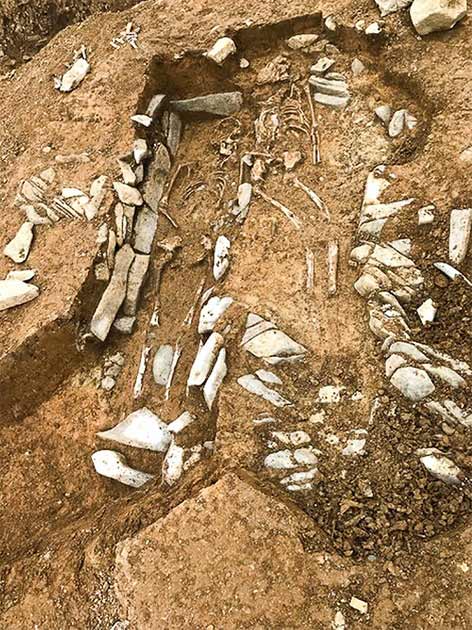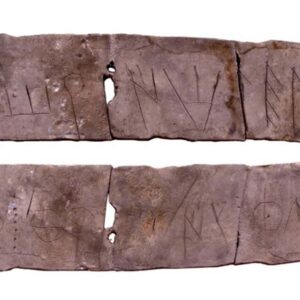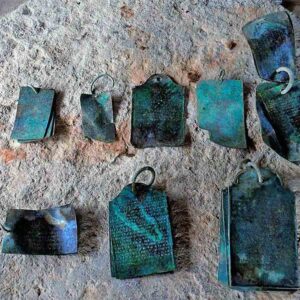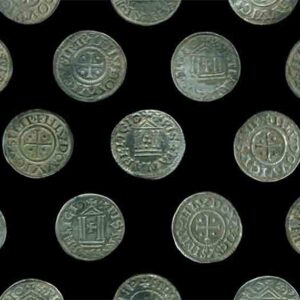Up to date
14 July, 2023 – 23:00
Sahir
Elite Roman Soldier Buried Face Down Might Have Been Shackled
- Learn Later
In 2022, a body of workers enterprise highway enhancements in Wales chanced upon the stays of a Roman soldier buried together with his sword and regalia. However one thing was odd about this burial – the Roman mercenary was buried face down – a observe that was by no means a optimistic manner of disposing of the deceased. Now new experiences reveal that nails have been found close to his neck, again, and toes, suggesting the soldier was additionally restrained at loss of life.
Barry and District News UK reported that the invention of the Roman mercenary, who was between 21 and 25 years outdated on the time of loss of life, was made close to 5 Mile Lane near the city of Barry in south Wales. The burial was excavated by Red River Archaeology and was discovered to this point to between the three rd and 4 th centuries AD.

Archaeologists consider they’ve unearthed the human stays of a Roman Mercenary on the 5 Mile Lane website in Wales. (Rubicon Heritage Services Ltd)
Unearthing a Roman Mercenary in Wales
Barry, a city within the Vale of Glamorgan, is positioned on the north coast of the Bristol Channel, within the southeast of Wales. Roman presence right here just isn’t unsurprising due to earlier discoveries, together with a number of farmsteads on the positioning of Barry Citadel and Biglis, and a powerful third century Roman 22-room constructing, with cellars, a central courtyard which was found in 1980. The discover at Glan-y-mor was believed to be related to naval exercise, a provide depot maybe.
- Artifact-Wealthy Historic Roman Village Unearthed By UK Archaeologists
- Archaeological Finds Inform the Story of Wales’ Holy Island
“It’s nice to be taught that the archaeological research at 5 Mile Lane has uncovered such an in depth historical past of the realm,” stated Emma Reed, head of neighborhood companies and transport, when discussing the present discover.
The excavations at 5 Mile Lane uncovered what has been termed a “multi-period panorama” with varied human settlements relationship again to the Neolithic interval, earlier than it turned a “rich Roman farmstead,” defined the Story Map Tour of the positioning. Amongst the finds, archaeologists unearthed the stays of a Roman mercenary, alongside together with his sword and a silver crossbow-style brooch, which was possible used to lock a cloak. The boorch suggests the solder was an elite member of the Roman navy.

The silver brooch discovered buried with the Roman mercenary. Credit score: Amgueddfa Cymru – Museum Wales)
Restrained at Loss of life?
Live Science experiences that the Roman soldier was discovered with giant nails close to his neck, again, and toes, which can indicated that he was restrained on the time of loss of life. The truth that he was additionally buried in a susceptible place, i.e. facedown, additionally raises questions in regards to the circumstances of his loss of life. Inclined burials had been usually reserved for criminals or people that had been disgraced not directly. It’s curious that the mercenary was, nonetheless, buried together with his sword and official regalia.
A close-by grave was additionally beforehand discovered containing the stays of a decapitated particular person whose cranium was place at their toes. Had been they two Roman troopers who dedicated a legal act that made them deserving of such burials?
The Romans and their Conquest of Wales
This complete Welsh area didn’t exist in the best way we all know it at present – the truth is, there was no Wales geographically. All the area consisted of Celtic peoples, organized into many tribes, who as such shared no social or political unity. Even when the Romans arrived, they didn’t give the geographical space any distinct title or identification.
When the Roman forces started their conquest of Britain in 43 AD, it will be solely 5 extra years earlier than they reached the borders of present day Wales, writes Ben Johnson for Historic. The conquest of the area would take one other 30 years, and was accomplished by 78 AD. The Romans stayed within the area until virtually the top of the 4th century – 383 AD to be exact.
One of many Celtic tribes who violently opposed the Romans had been the Silures, by the way from the southeast Wales area. They valiantly defended their land between 49 and 75 AD, however finally couldn’t match the firepower and terrestrial energy of the Roman military.
- Romanitas in Early Medieval Wales: The Proof of Latin Standing Stones
- Metallic Detectorist Finds Uncommon Misplaced Roman Lead Ingot in Wales
The standard way of life and habitation for the Welsh tribes, had been round timber farmhouses, experiences Barry.cymru. The Romans launched substantial stone homes, which turned the dominant mode of structure by the 2nd century. The elites would change these with totally fledged villas with facilities like central heating, baths, wall plaster, mosaics.
On this explicit space, the Romans would additionally construct a number of roads, one thing that they had been famous for throughout their reign. These days a number of roads have been constructed within the space, together with the arterial A48 that runs by means of the center of Vale of Glemorgan. In and round these roads, a number of vital archaeological discoveries have been made together with Roman cash, jewellery, and generally weaponry.

Archaeologists additionally uncovered the stays of a Bronze Age burial monument. (Rubicon Heritage Services Ltd)
Prime picture: Skeletal Stays at 5 Mile Lane close to Barry in Wales. Supply: Rubicon Heritage Services Ltd
By Sahir Pandey





